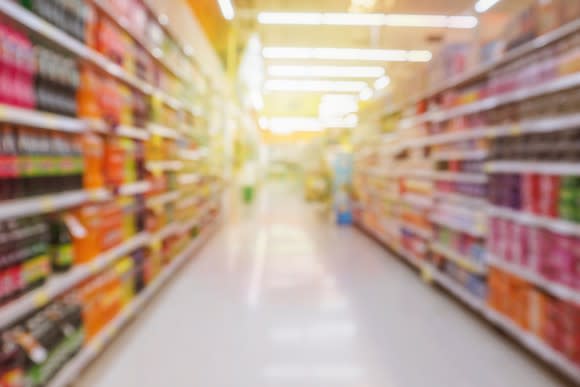How Far Will Shiny Digital Tools Take Global Beverage Giants?
How might tiny companies with cutting-edge data analysis tools assist multinational beverage concerns in competing for valuable shelf space? A recent article in Forbes notes that this year, beverage giant Coca-Cola (NYSE: KO) is replacing its system of periodic manual store shelf audits with technology from Singapore-headquartered retail analytics start-up Trax. The time-consuming manual audit system, in which field representatives physically visit stores and count bottles, can take months to return valuable information on retail inventory movement and competitor product placements.
Trax uses image recognition technology, combined with analytics and artificial intelligence, to obtain the basic data of a shelf audit while providing more comprehensive insights. Shelf images uploaded to Trax's cloud servers are analyzed by what the company terms its "advanced computer vision algorithms," and a monthly analytic dashboard is provided to clients. The software also provides insights into store trends within the packaged goods products that surround beverage aisles.
According to Trax's website, it offers these services under two primary products, Shelf Pulse and Shelf Intelligence Suite. Both are enhanced with additional insights provided by global measurement specialist Nielsen Holdings and privately held consumer goods sales and marketing agency Acosta.

Image source: Getty Images.
Tools of the type produced by Trax will help companies like Coke obtain a much faster and more complete picture of the grocery, convenience store, and club shopping channels. According to Forbes, Coca-Cola will now be able to increase the frequency of its corporate-initiated marketplace data survey, from twice a year to six times annually.
Relevance to Coca-Cola strategy
As the world's largest beverage company has shifted its business model away from manufacturing and toward marketing, it's embarked on a widely watched journey of portfolio diversification. Most shareholders are aware of these sea changes in the company's business model.
However, as I discussed earlier this year, Coca-Cola is also employing three distinct tactics in the near term to improve earnings growth. First, it's leaning toward pricing power versus selling on brute volume to improve the quality of its sales. Second, the organization is "lifting and shifting" brands between continents to spur the rate of innovation. Finally, Coca-Cola continues to roll out low-sugar variants in its sparkling beverages portfolio to meet consumer demand.
Visual intelligence can assist with each of these strategies. Coca-Cola can piece together a more complete view of competitor pricing as it adjusts its price-volume mix. It can also achieve a better understanding of local brands as it seeks to transfer winning beverages from one geographical region to another. And management can get a quicker read on how a sugar-free offering like Coke Zero, for instance, is faring as it extends across new markets.
Of course, much of this data in the future will be analyzed by the company's bottlers as much as it will by Coca-Cola, as bottlers ultimately are responsible for shelf distribution. According to Forbes, the beverage giant is already testing Trax with a handful of its North American bottling partners, and my guess is that Coke's global bottlers will also adopt the technology soon.
For beverage companies, getting software like Trax in the hands of bottling distributors is almost as important as management's own use of it. Take Coca-Cola investee Monster Beverage (NASDAQ: MNST), for example. As I wrote in May, the energy drink specialist is building on its long-term potential by methodically expanding via Coca-Cola bottlers around the globe.
In some geographical regions, Monster is working with bottlers to create an energy drink shelf where one doesn't already exist. On the company's most recent earnings conference call, Chief Operating Officer Hilton Schlosberg provided the example of the China market:
And our bottlers -- I've just come back from China -- have set themselves an objective of focusing and trying to achieve what [we succeeded initially with] in the U.S. -- to develop an energy shelf so that Chinese consumers can go to a shelf and select an energy drink. When our product is placed in a Coca-Cola cooler adjacent to a Coke and a Sprite, it doesn't help the consumer understand what the product is.
Monster investors may be focused on near-term issues clouding insight into the company's margin, but you can see how over the long run, creating an energy drink category on convenience shelves in China could help create exceptional value.
Monster and its Coca-Cola bottling partners could use visual shelf technology to better understand which local brands it needs to displace to create this category in a mammoth market like China. They could also gain a view into which Chinese beverages actually complement Monster sales on the shelf, thus influencing ongoing product placement. Most importantly, Monster could theoretically get much faster data than is currently possible, on which of its innumerable energy brands is enjoying the most traction with Chinese consumers.
Of course, there's one obvious drawback to such shiny digital tools as Trax provides. As an industry increasingly adopts the next generation of technology, any single company's advantage in using the software gets negated. But for now, replacing the slow manual process of obtaining shelf insight with an analytics-rich dashboard should serve early adopters well in the never-ending battle for product real estate.
More From The Motley Fool
Asit Sharma has no position in any of the stocks mentioned. The Motley Fool owns shares of and recommends Monster Beverage. The Motley Fool has a disclosure policy.

 Yahoo Finance
Yahoo Finance 